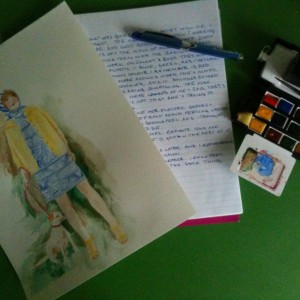What will make your characters real?

What is REAL?” asked the Velveteen Rabbit one day. “Does it mean having things that buzz inside you and a stick-out handle?”
“Real isn't how you are made,” said the Skin Horse. “It's a thing that happens to you. When [someone] loves you for a long, long time, not just to play with, but REALLY loves you, then you become Real.”
“Does it hurt?” asked the Rabbit.
“Sometimes,” said the Skin Horse, for he was always truthful. “When you are Real you don't mind being hurt.”
—Margery Williams, The Velveteen Rabbit
The secret to writing a truly good character – a person who has real passions, flaws, judgments, obsessions and blind spots – involves a great deal of honesty. But not in the way you might expect.
Writing real character requires so much work, it’s easier to skip it and just write a story about stuff that happens. After all, you can always write scenes and have people walking around in them. That works. You just make up a name for your character and give her a description - a job, a wardrobe, a pet. You know, "details."

Character work is partly about the art of creating composites from a bed of real detail. That's when you take the way a cashier paints her nails and the way your mother walks her dog and the funny way your high school teacher pronounces the word "apricot" and put all of those things into one person and name her "Frenchie." Then you have what we call a character.
When you throw in a want/need and a secret – say, Frenchie had a son when she was 16, gave him up for adoption, and recently believes she found him working at a library in Whistler, BC – then you have drama. Done!
Except that Frenchie doesn't quite have the power to come alive off the page, yet. She has qualities and details, but she isn't real.
Writing character is not just about imagination and observation -- it's also a matter of love and respect. Writing real character, I'm afraid, requires advanced vulnerability. There are two levels to this.
Level One
If you're going to write honestly about composites created from some of the people in your life, you risk exposing their thoughts, conversations, mistakes, fears, and betrayals. What will they think of you if you write that? Will they recognize themselves? What will happen if they read this? Etc.
We’ve all been there at one time or another. But to take your character work to an even higher level, the secret is in Level Two:
Level Two
The things about yourself that you're most afraid to look at, name and explore – your judgments, your fears, your insights, your unmediated truenesses – these will be the strongest elements in your character work.
Therefore, it can be difficult to write real character. Especially if you don't like to be honest with yourself. Or if you’re just out of practice.
In order to write a real character, you have to be honest about who she really is. Then you must love and respect what she has to offer: imperfections included, ugliness included, contradictions included.
Going deep means being up front about what you observe in others, but it also means being frank about what you observe about yourself.
Writing great character is the transmission of those two streams – self and other – at the same time.
I love writing fiction because it lets me make things up. I can invent people and let them do things I would never, ever do. In this way, through writing character, I feel like I can escape myself and become someone else.
And it is escape! But it is also the opposite of escape.
Ask yourself:
1. What if your resistance to deep character work is because you're afraid of exposing other people in your life?
2. What if the thing that is holding you back is the fear of exposing too much of yourself?
3. What would happen if you wrote it anyway?
Try it.
xo,


12 comments
Leave a comment